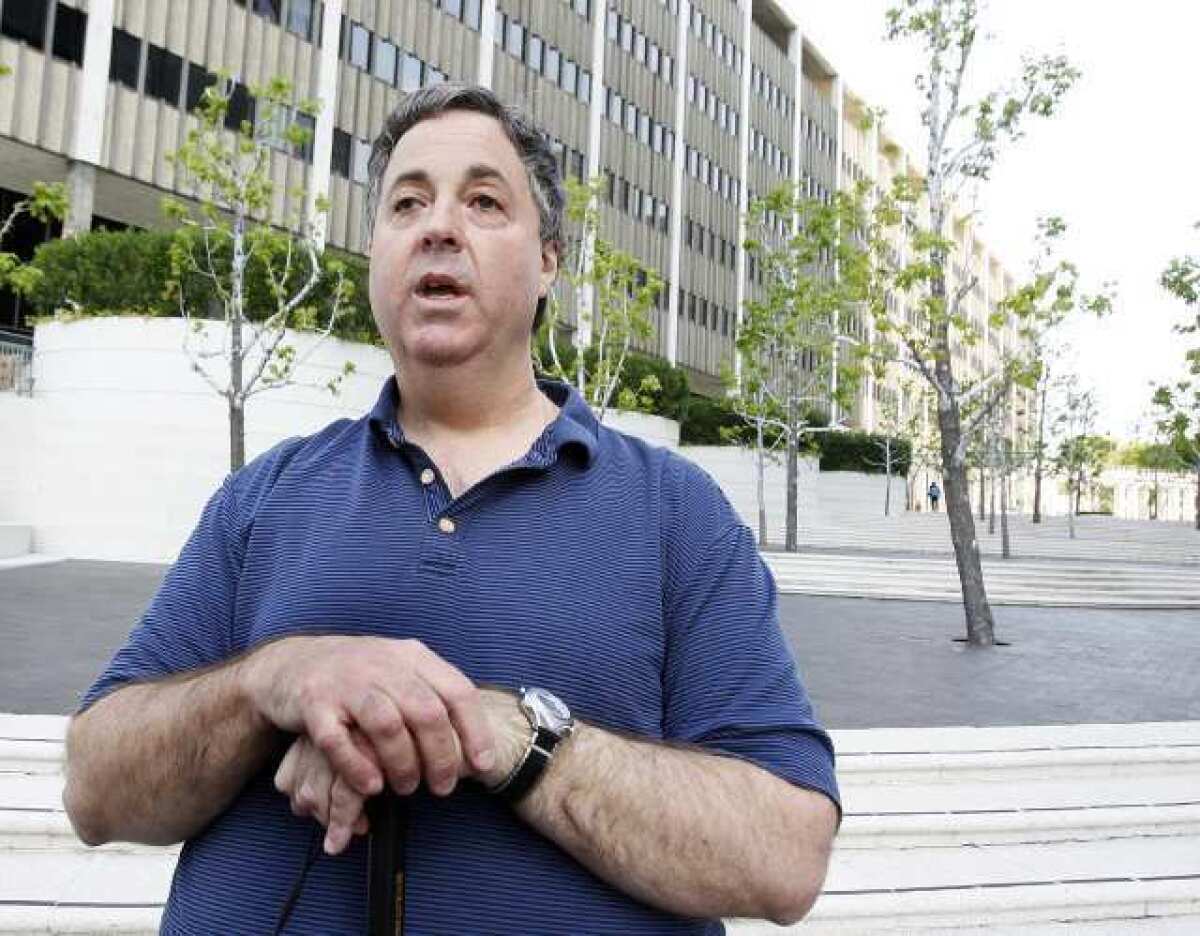Blind man’s federal building business is downsized

- Share via
A blind Burbank man is fighting to salvage his food service business in a downtown Los Angeles federal building more than a year after an administrative law judge ordered a state agency representing him to enter into arbitration on the matter.
Michael Fields’ case has been tied up in a morass of government bureaucracy since the General Services Administration, which owns the building at Los Angeles and Temple streets, began dismantling his lobby food cart operation in September 2009.
Located on the first floor of the building since 2002, Fields’ operation at one point included four refrigerated display cabinets, an 8-foot cappuccino cart, a 6-foot coffee cart, small canopy stand, tables and chairs.
His business — with four full-time employees and a wide-ranging menu — was generating a steady $1,500 a day. His snack shop on the third floor averaged about $400 a day.
But after the General Services Administration reduced the size of his operation to an 8-foot coffee cart and a 4-foot-long condiment counter, revenue plummeted to just $300 a day, Fields said.
“They took away 75% of the business,” Fields said, adding that he now has just one employee and has been relegated to an alcove in the lobby.
Under the Randolph-Sheppard Act, the California Department of Rehabilitation works with blind individuals to provide income opportunities in federal buildings so they can become self-sufficient.
State Administrative Law Judge Vincent Nafarrete ruled in January 2011 that the Department of Rehabilitation, which awarded Fields the contract, had to file a complaint with the U.S. Department of Education, enter into arbitration and try to return Field’s food-service business to its original configuration and location. Though the federal education department had no direct involvement in the reduction of Field’s operation, it is tasked with dealing with disputes arising out of the Randolph-Sheppard Act.
Initially, the state Department of Rehabilitation wanted to deal with the federal agency informally. Fields eventually sent a letter to the state agency demanding arbitration and a hearing, both of which he is entitled to under the Randolph-Sheppard Act.
After a hearing that took several months, Nafarrete ruled in Field’s favor, and the Department of Rehabilitation filed the complaint with the federal department last July. But arbitration has yet to begin.
“By its actions, [the General Services Administration] reduced the size and offerings of the [business] and caused [it] to become less attractive and inviting to customers and employees of the building,” Nafarrete wrote in his decision.
Since then, the complaint has hit several snags, including the retirement of the official initially assigned to monitor the case and news that a prospective candidate to chair the arbitration panel had declined to serve.
Mary Yang, a program specialist with the U.S. Department of Education who is now monitoring the complaint, said two more prospective chairs were contacted by email last month, but so far, neither has responded.
She plans to contact the attorneys representing each side to see how they want to proceed — continue to try contacting the two prospective candidates, or look for new ones.
In the meantime, Fields said he feels caught in the middle and thinks the federal agency wanted to move him out of the way to attract an operator for a cafeteria that was in the planning stages when his operation was being dismantled. The cafeteria is currently being built on the second floor.
A representative for the General Services Administration declined to comment on the complaint.
Fields said he’s also frustrated that the wheels of justice are moving so slowly.
His attorney for the evidentiary hearing, Cindy Panuco, said there’s nothing pushing the arbitration forward.
“There are no deadlines set in the regulations,” she said.
But Fields can take solace in the fact that he’s not alone. Yang said that of the 12 Randolph-Sheppard complaints that were filed during the same fiscal year as Fields’ complaint, only two have been closed.
